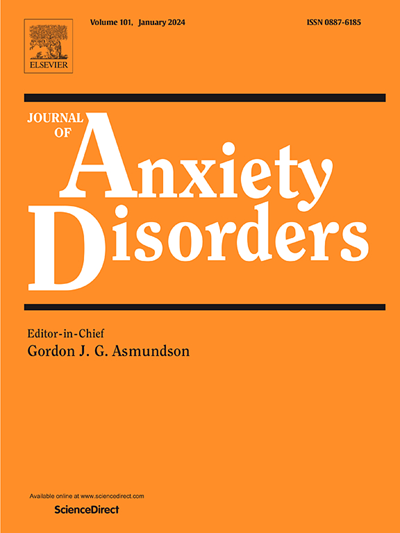Post-event processing in social anxiety: A scoping review
IF 4.8
2区 医学
Q1 PSYCHIATRY
引用次数: 0
Abstract
Graded exposure successfully reduces fear in specific phobias and anxiety disorders, yet social exposure in daily life often fails to mitigate social anxiety. Post-event processing, perseverative, negative, self-referential thinking that occurs following a social-evaluative event, may partly explain inhibited desensitization to social fears. Post-event processing has been studied extensively since its first description by Clark and Wells (1995) and previously reviewed (e.g., Brozovich & Heimberg, 2008; Wong, 2016). However, these reviews are now dated or limited in scope. In the present scoping review, we pay particular attention to contemporary research that addresses unanswered questions raised in past reviews (e.g., Brozovich & Heimberg, 2008), synthesizing existing knowledge. Specifically, we discuss post-event processing’s evolving role in cognitive models of social anxiety disorder, its core features, its eliciting situations (e.g., performance vs. social interactions), its relation to other cognitive and affective constructs (e.g., memory, performance appraisal, self-focused attention), and its assessment. Our findings indicate that post-event processing is more frequent after performance situations than social interactions, is related to negative memory biases, is bi-directionally related to worsening performance appraisals, and may be precipitated by self-focused attention. Future research directions include elucidating post-event processing’s course, clarifying post-event processing’s potential causal role in the development of social anxiety disorder, and identifying factors that underlie post-event processing’s deleterious nature.
社交焦虑的事件后加工:一个范围回顾。
分级暴露成功地减少了特定恐惧症和焦虑症的恐惧,但日常生活中的社交暴露往往不能减轻社交焦虑。在社会评价性事件之后发生的事件后加工、持续性、消极、自我参照思维可能部分解释了对社会恐惧的抑制脱敏。自Clark和Wells(1995)首次描述事件后处理以来,人们对其进行了广泛的研究,并对其进行了回顾(例如,Brozovich和Heimberg, 2008;黄,2016)。然而,这些审查现在已经过时或范围有限。在当前的范围综述中,我们特别关注当代研究,这些研究解决了过去综述中提出的未解问题(例如,Brozovich & Heimberg, 2008),综合了现有知识。具体而言,我们讨论了事件后加工在社交焦虑障碍认知模型中的演变作用,其核心特征,其引出情境(例如,表现与社会互动),其与其他认知和情感构念(例如,记忆,绩效评估,自我关注)的关系,以及其评估。我们的研究结果表明,事件后加工在表现情境后比社会互动后更频繁,与负性记忆偏差有关,与绩效评估恶化双向相关,并可能由自我集中注意力促成。未来的研究方向包括阐明事件后加工的过程,明确事件后加工在社交焦虑障碍发展中的潜在因果作用,以及确定事件后加工有害的潜在因素。
本文章由计算机程序翻译,如有差异,请以英文原文为准。
求助全文
约1分钟内获得全文
求助全文
来源期刊

Journal of Anxiety Disorders
Multiple-
CiteScore
16.60
自引率
2.90%
发文量
95
期刊介绍:
The Journal of Anxiety Disorders is an interdisciplinary journal that publishes research papers on all aspects of anxiety disorders for individuals of all age groups, including children, adolescents, adults, and the elderly. Manuscripts that focus on disorders previously classified as anxiety disorders such as obsessive-compulsive disorder and posttraumatic stress disorder, as well as the new category of illness anxiety disorder, are also within the scope of the journal. The research areas of focus include traditional, behavioral, cognitive, and biological assessment; diagnosis and classification; psychosocial and psychopharmacological treatment; genetics; epidemiology; and prevention. The journal welcomes theoretical and review articles that significantly contribute to current knowledge in the field. It is abstracted and indexed in various databases such as Elsevier, BIOBASE, PubMed/Medline, PsycINFO, BIOSIS Citation Index, BRS Data, Current Contents - Social & Behavioral Sciences, Pascal Francis, Scopus, and Google Scholar.
 求助内容:
求助内容: 应助结果提醒方式:
应助结果提醒方式:


